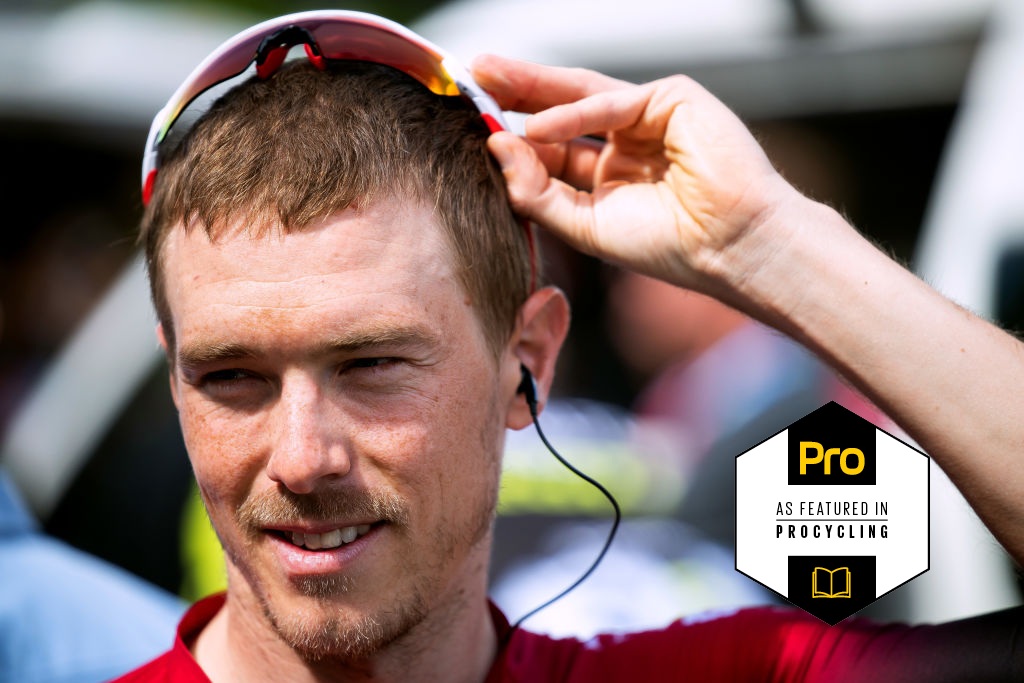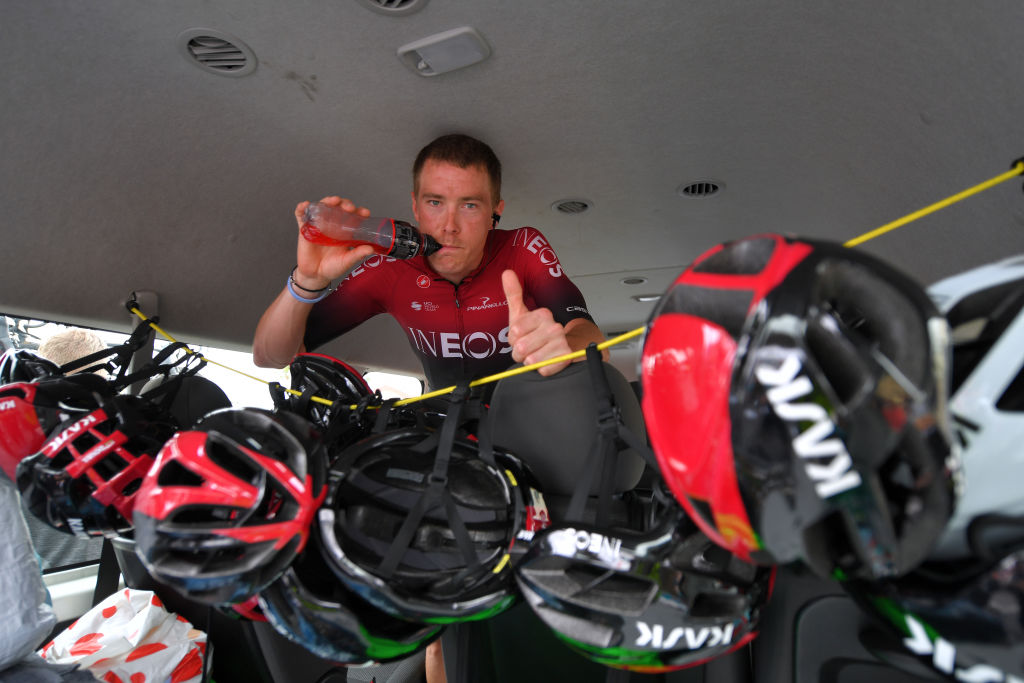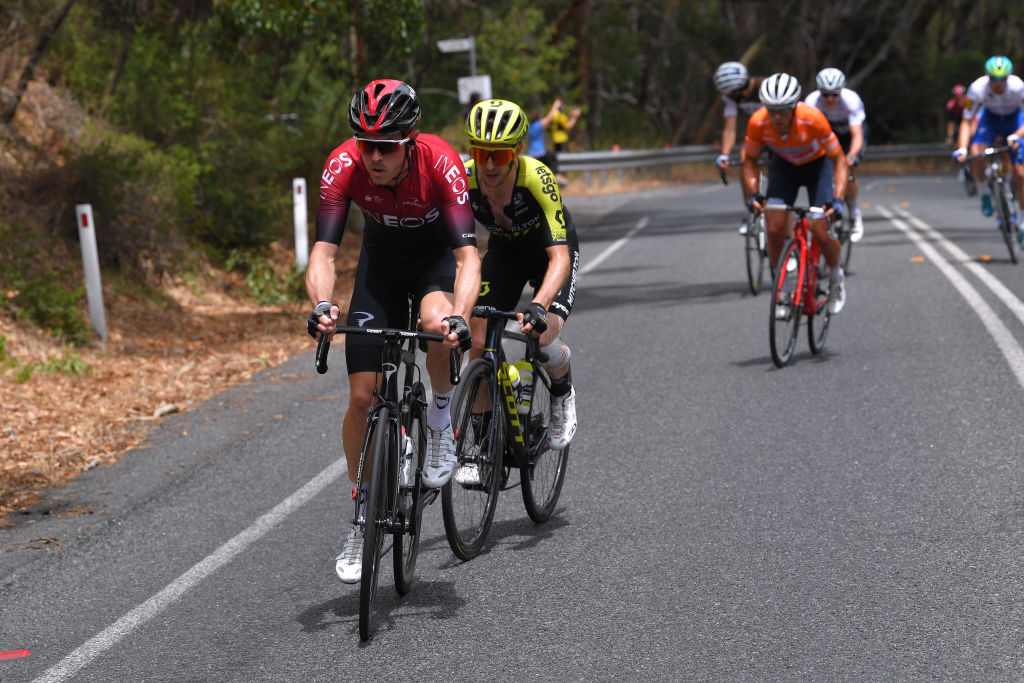Rohan Dennis: Back to basics

Procycling magazine: the best writing and photography from inside the world's toughest sport. Pick up your copy now in all good newsagents and supermarkets, or get a Procycling subscription.
Rohan Dennis hit the headlines recently after seeming to break coronavirus lockdown rules by going for a drive in Girona, Spain and posting about it on social media. He moved to Team Ineos this year after an acrimonious split from Bahrain-Merida at the 2019 Tour de France. Procycling was at the Tour Down Under, his first race with the team, to see how he's settling in.
This article appeared in Procycling issue 266, March 2020
Sitting on a plastic chair plonked on a grass oval following the first hill-top finish of the Tour Down Under in Paracombe, Rohan Dennis is chatting with Team Ineos sports director Brett Lancaster, saying something about the pace of accelerations on stage 3.
Down Under marks not only Dennis' WorldTour debut with Ineos but his first stage race since walking out of the Tour de France last summer - to serious consequence. The 29-year-old won his second time trial world title in between, but in Paracombe felt the physical toll of consecutive days of racing and got squeezed out on the run-in to the Torrens Hill Road climb, where Richie Porte won the stage and laid the foundations for his overall title. Dennis and one other teammate have opted to get a lift rather than cycle back to the race hotel with the rest of the squad that has already left.
It's the first day Dennis has recognised his transition to Ineos, which he joined three months after Bahrain-Merida terminated his contract in September, as anything other than "seamless". His new teammate Luke Rowe hadn't realised Dennis was flagging, towards the end of the stage. "I'm not a big talker on the radio and I found that Luke would have liked to have known that I wasn't on the back of them," Dennis tells Procycling.
"Communication is a big thing for him. It's a good thing, just something I'm not used to doing. I'm used to: work through it myself, get back to the team when I need to and not stress anybody out. But I think that in this team [it's] the opposite. They go, 'You're stressing us out, we don't know where you are.' I have to really work on that communication side of things when it comes to the racing."
Get The Leadout Newsletter
The latest race content, interviews, features, reviews and expert buying guides, direct to your inbox!
Rowe is an established road captain at the British squad and Dennis says he's especially clicked with the Welshman, who has provided some introductory guidance. "We just try to make it clear to him that he's leader at this race and anything he asks for he's going to get, within reason," says Rowe. "You can have a leader for the day but if he's not good he's got to speak up, you know? We've got to know that.
"Each and every day you've got to get the most out of each person and the best way to do that is communicate and knowing where to use your troops."
It's well known in cycling that Dennis has a streak of audacity as wide as the outback. He entered the Tour Down Under in 2015 with the aim of supporting then BMC teammate and Australian legend Cadel Evans in an overall bid. However, when Dennis saw an opportunity to attack on the short but steep climb to the finish line in Paracombe he took it, winning the stage and ultimately the race title.
The same trait has also contributed to his own frustrations though, which boiled over on stage 12 of the Tour de France. Dennis in the past has been annoyed when teams haven't listened to or followed how he believes a race should be executed. He's absolutely unwavering on his beliefs.
"I've known Rohan for a long time. I raced with him in the U23s and I've always got on really well with him. He's always been a powerhouse of a rider and someone I've respected on and off the bike," says Rowe.
"A lot of the reason he was annoyed last year was because he wasn't … you know, there are a few things, mainly down to communication, which were letting him down and he felt hampered his performance. Hopefully here he can get the access to the best kit and team-mates, who will 100 per cent buy into him when the time is right.
"[It's] just trying to get through to him that we're the type of teammates, I like to think, that will go that extra mile, and just don't be afraid to ask for any help any time. We really pride ourselves on giving him the best opportunity to succeed by supporting him the best way possible."
Dennis admits he's not accustomed to asking for help but will have to learn that too given Ineos, Rowe says, isn't as autocratic as it appears from the outside.
"That's one big misconception of the team. People seem to think it's super strict," Rowe says. "A lot of people who come here and guys who have left and gone to other teams, said the most fun they've had was in this team. I'm a firm believer that if you're going to have fun off the bike then that will translate to good results on the bike."
Before Down Under, Ineos flew out a mechanic from Belgium and sent a soigneur and sports director Brett Lancaster to support Dennis at the Australian time trial championships where he finished second to Luke Durbridge of Mitchelton-Scott.
"Rohan fits in really well with the team. He's no different to anyone else. He loves a joke and the British guys, they like a lot of banter," says Lancaster.
Dennis appeared happy at Down Under and cracked jokes whenever the opportunity arose. In a pre-race press conference, he teased outgoing race director Mike Turtur when the latter made "special mention" of hosting and showcasing the rainbow jersey at his event – referring only to Trek-Segafredo's road world champion Mads Pedersen. "We haven't got a time trial in the race," Turtur responded.
Dennis describes his second consecutive time trial world championship victory in Yorkshire last September as "the biggest job interview of my life". This year he placed fourth overall at Down Under in what was a promising start with Ineos but not one completely free from the demons that derailed his 2019 campaign.

Happiness, or lack thereof, is effectively what Dennis attributes for his walk out of the Tour. At the start of stage 12 in Toulouse, Dennis had answered questions pertaining to the next day's individual time trial that Bahrain-Merida (now Bahrain McLaren) expected him to perform in. He gave a soundbite on it and confirmed a rumour that Vincenzo Nibali, who left Bahrain for Trek-Segafredo disgruntled but on his own terms this season, had a stomach complaint.
No one had predicted that shortly into the stage, Dennis would dismount his bike, hitch a lift to the finish line and leave the race before Simon Yates won in Bagnères-de-Bigorre.
Dennis's face was a mixture of hurt and fury when he left. His shoulders were squared off and he walked away from the race flanked by his agent, who pushed away a TV camera crew. Rumours of a rift over equipment began to circulate in the immediate aftermath, which former general manager Brent Copeland, who wasn't at the race at the time, dismissed.
Dennis temporarily deleted his Twitter account in the melee that followed. He never competed for Bahrain again. At the time of going to print, he was in UCI arbitration with them, claiming breach of contract, wrongful termination and "malicious intent to cause damage to health and reputation". Bahrain are not commenting while the process is ongoing.
Newly appointed general manager Rod Ellingworth says he is treating the team as not just a rebranded one, but a new one.
"I was good friends and I still talk to a lot of the riders and staff. I've even spoken to some of the McLaren people since. It was just the environment," says Dennis.
When directly asked why he left the Tour, Dennis says: "Personal family reasons between the person I was becoming due to the situations I was put under, or the environment that I was in, that was causing me to be not a good or a happy person to be around.
"That environment was the team environment. It was snowballing, it was getting worse and, in the end, I didn't want to be a statistic of a sportsperson who was potentially going to be divorced."
He won't be drawn on specifics about the 'team environment' but did consult with his sports psychologist Dr David Spindler in the aftermath and around his rainbow jersey build-up.
"I honestly believe if I did continue and finish the stage it would have been even worse because it would have looked even more planned. Looking like, 'Now I'm going to exit just to annoy the team,'" Dennis says. "Whereas me exiting was for the benefit of my family. I had a pretty frank conversation with my wife just before [the Tour de] Suisse and some of the things she said really brought it home about the type of person I was becoming because of the situations I was in and the way I was handling them.
"The team and I decided we would sort it out behind closed doors. Then it just snowballed from there and moves were made that I don't think were the best for everybody."
Dennis didn't anticipate that he'd be expelled during his first season with the team despite observing that he felt there were "clear incentives" to get him to "move on".
"There was a lot of interest [from teams] directly after my exit of the Tour de France. There was speculation that it's [terms with Bahrain] going to end quick and, 'Okay, this could be a good deal,'" he says. "It died down soon after the Tour de France finished. We were thrown a curve ball of being terminated just before Worlds, which wasn't really good. It was really post-Worlds that real conversations were starting to open up."

Bahrain terminated Dennis's contract 12 days before the time trial world title in Yorkshire, but waited until after he had won the time trial and played a support role for Australia in the road race to announce it.
"Yorkshire, I knew physically that I could do it but there was a lot of weight on my shoulders with all the other stuff. More or less, it was probably the biggest job interview of my life," Dennis says.
Ineos confirmed in December they had given him the job and on one hand the appointment is a dream fit. Lancaster says Dennis is "tech driven", and as a former Hour record holder he knows all about 'marginal gains'. Ineos is also born from a British Cycling structure, similar to Cycling Australia's institutionalised track programme that Dennis came through.
Yet there was conjecture as to how the 29-year-old's own ambitions to develop into a grand tour contender would marry with the team that in 2020 boasts four proven grand tour winners and a long succession list.
Dennis, in recent years, has spoken of his perceived need to lose weight. He's focused on climbing, arriving at hill-top finishes puffy-faced, eyes bloodshot and half vacant from the efforts. For a time, he surpassed Porte as being considered Australia's 'next' Tour champion.
But a month into his fresh start with Ineos, Dennis says that those ambitions are done. He'll refocus on shorter stage races and time trials even though the
Giro d'Italia, which along with the Tokyo Olympics is a major 2020 season target for him, features three time trials this year.
"If I'm ever going to win a grand tour, I'm in the right place. I just don't think that's what I really want to try and do any more," says Dennis. "GC riders for grand tours have a completely different mindset and not just on the bike but also off the bike, having to sacrifice 99.9 per cent of having a life.
"I made it clear my objectives weren't anything to do with GC grand tour-wise when I was talking to Dave Brailsford."
Dennis has ridden solo for the last six months but at Ineos he will have to become a fortified team player. And he knows it. At the end of the Tour Down Under, Dennis wasn't niggling, or trying to assert himself. He was listening, commentating, taking directions. Still fiery, but somewhat softer.
"You can see on my face how much the environment is different," he says, smiling. "Even if there is a small issue, we talk about it in a constructive way and then we move on."
Follow @Procycling_mag on Twitter